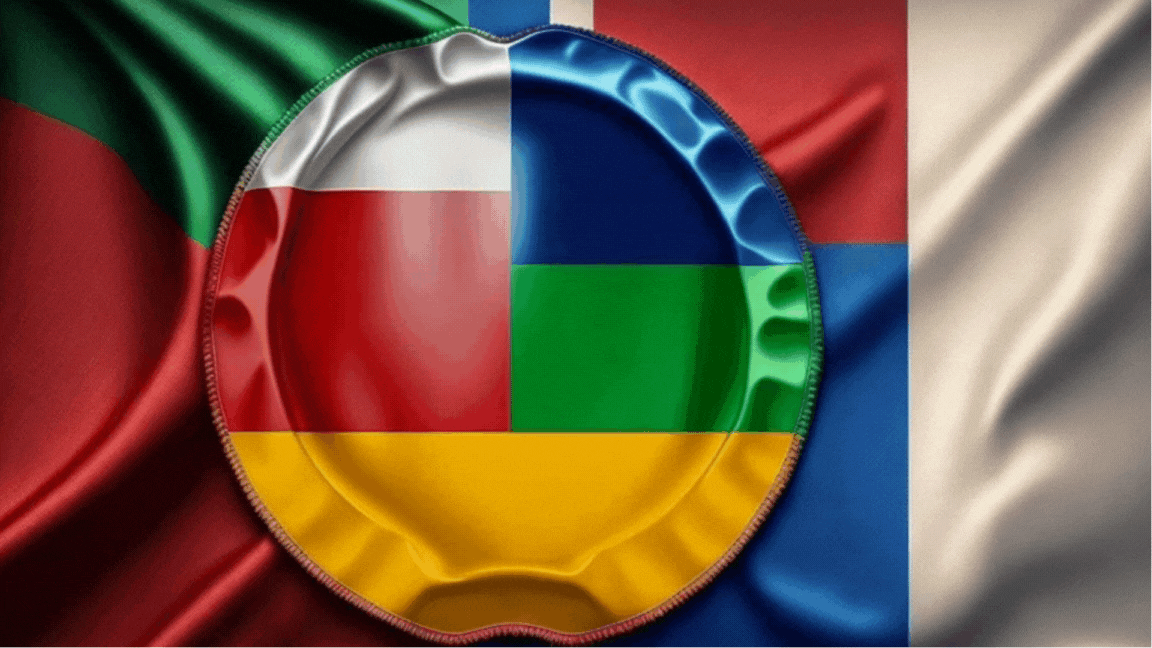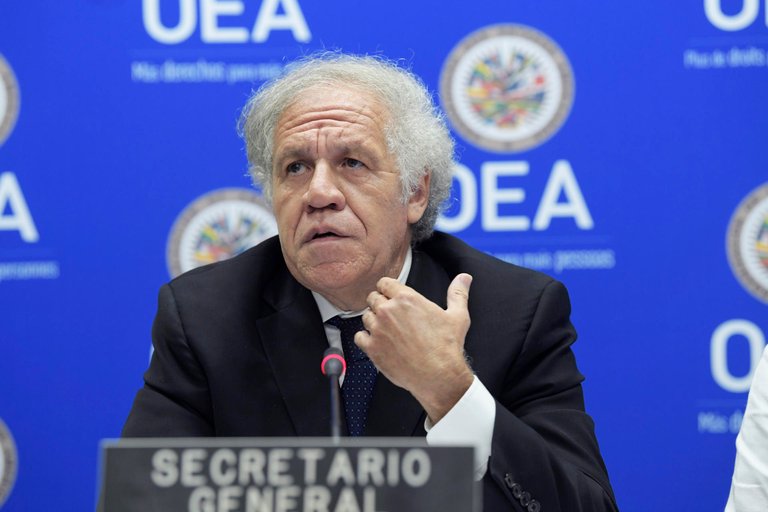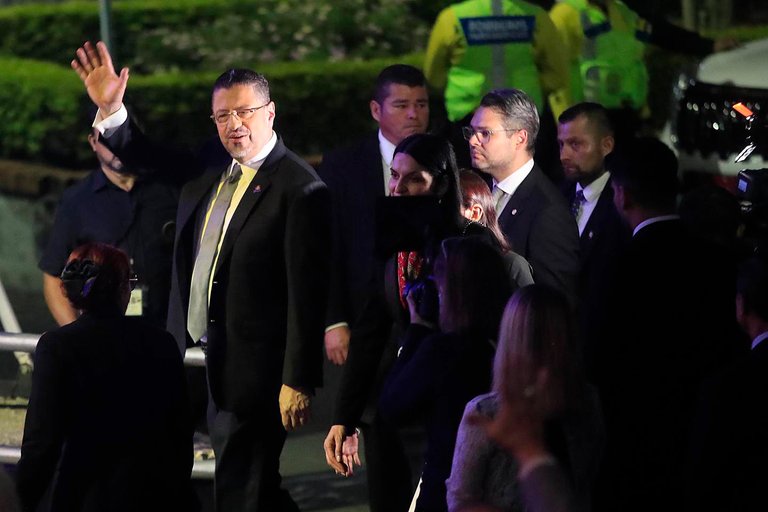
Corruption: an evil that eats away at the region
This scourge, together with very low rates of effective citizen participation in the exercise of power, and inefficient policies that don't focus on human development, have plunged the region into a huge crisis, without excluding other factors that we have discussed on other occasions, such as the lack of sound international support to enhance its productive and service capacities. I remember sharing here the fact that the funds diverted by corrupts in Perú were equivalent to those needed to end poverty. In the last few hours, new events have emerged in this sense, which show us that the road ahead is extremely long and hilly. Furthermore, what we will be commenting here serves to establish that corruption in Latin America operates in all dimensions of society, but fundamentally in the political and economic spheres.
The Public Prosecutor's Office continues "shooting" against the electoral process in Guatemala
OAS Secretary General Luis Almagro charged against the Guatemalan Attorney General's Office, as the agency persists in its attempt to torpedo the natural course of the already twisted Central American democracy, specifically targeting Bernardo Arévalo, the surprise social democratic President-elect to be sworn in—in principle—next January 14. Almagro referred to the Public Ministry in the following terms:
The President-elect and his presidential running mate, Karin Herrera, continue to face an obstacle course marked by judicial decisions that go against the broad mandate given to them by the Guatemalan citizenry in this year's presidential elections. The judicial decisions stand in the way of what was President Alejandro Giammattei's public commitment to respect the transfer of power on January 14, 2024, to the elected presidential formula. The Public Prosecutor's Office is still determined to bring cases from the past to affect the political transition.
 Luis Almagro, a polemical Latin American politician (source of the image).
Luis Almagro, a polemical Latin American politician (source of the image).The head of the highest electoral authority alerted this Tuesday about the "political persecution" against the organism, which shows that the crusade of the Public Ministry—also endorsed by a controversial judge—operates several scenarios to bombard the electoral process. By the way, before sharing part of the declarations of Irma Palencia, the head of the Guatemalan Supreme Electoral Court (TSE in Spanish), since we are talking about corruption, I would like to recall that this same body had a very controversial deployment during the certification phase of candidates to the different representative bodies of the State power, with arbitrary decisions that removed some figures from the electoral race with debatable arguments. In contrast, they paved the way for others with a dismal past marked by corruption and other criminal acts. When after Arévalo's victory the TSE itself allegedly became the target of arbitrary measures and actions from the Public Ministry, I came to think that its magistrates were happily assuming a stage role in hidden complicity with them, but it seems to me that it would be irrational with all that they have experienced in their flesh to continue valuing that option. Returning to the present, Palencia observed the following:
We are invaded by the increasingly strong concern that the main motive of all this political persecution—with the appearance of legality—(is) that new magistrates will be integrated into the TSE, possibly pursuing to change the results obtained in the general elections.
 Irma Palencia (source of the image).
Irma Palencia (source of the image).It is a grave accusation, but if there is something that the Public Prosecutor's Office, led by the controversial Consuelo Porras, has demonstrated, it is that they are exploring all possible alternatives. The head of the TSE made special reference to the withdrawal of the immunity of four of its magistrates by the legislative branch, accused of having purchased software for the electoral process higher in value than another alternative, which, in my opinion, says nothing in principle, since in an analysis to select proposals the cost is one of the variables to be taken into account, although a very important one. But Palencia also particularly emphasized that there were due process debts, because his colleagues were never notified "as parties". As January 14 approaches, some take it for granted that Arévalo will be able to move into the Presidential House, but I am firmly convinced that we are far from having seen the last of the troika formed by Porras, the supposedly anti-corruption prosecutor Rafael Curruchiche and Judge Fredy Orellana.
Paraguay / Brazil
A dozen individuals, including a former head of the Paraguayan Air Force and other active military personnel, were arrested yesterday, Tuesday, in a decisive blow by the new government of Santiago Peña against arms trafficking, with a score of raids that included a government agency with the mission of "providing support of war material (to) the Armed Forces". With the support of Brazil and the United States, this operation was carried out against an alleged "international arms trafficking scheme" which has been under investigation for at least three years, with a company with its headquarters in the Paraguayan capital being its central command. The company "would be responsible for importing thousands of pistols, rifles, and ammunition from various European manufacturers based in Croatia, Turkey, Czech Republic, and Slovenia", the Public Prosecutor's Office said in a statement. The traffickers would remove the serial number from the imported weapons and then move them to Brazil and other countries here through intermediaries operating on the border with the South American giant—an area under the spotlight of authorities in both countries due to abundant criminal activity. Lula from Brazil referred to the joint operation as the "largest (one) in Brazil's history against arms trafficking", with five arrest warrants executed on his side. Around 43,000 weapons were allegedly trafficked by the interdicted organization, which would amount to some US$240 million in total value of the related operations.
 General Arturo Gonzalez was in charge of the Paraguayan Air Force until the last days of November. He defrauded his oath as much as he wanted, serving spurious interests. He lived surrounded by luxuries, and in his house was found in total the equivalent of some 135,000 dollars. In the photo, taken during the raid, he is the one who appears seated, accompanied by his wife (source of the image).
General Arturo Gonzalez was in charge of the Paraguayan Air Force until the last days of November. He defrauded his oath as much as he wanted, serving spurious interests. He lived surrounded by luxuries, and in his house was found in total the equivalent of some 135,000 dollars. In the photo, taken during the raid, he is the one who appears seated, accompanied by his wife (source of the image).Compromising audios mobilize Costa Rican president against former minister and a national newspaper
A former minister recorded conversations with President Rodrigo Chaves in which he allegedly discussed details of a contract that had not yet been put out to bid, financed by the Central American Bank for Economic Integration through a donation of US$300,000. The audios, published in the national newspaper La Nación, show that the person who ended up being awarded the contract was the one who drafted the bidding conditions, after having attended 15 times to the Presidential House. In addition, Chaves would have intended that his image consultant would obtain benefits from the contract. So the president has counterattacked strongly this Tuesday, denouncing the former minister and also La Nación. "(The media) becomes an accomplice of a criminal offense by publishing a conversation illegally recorded and also illegally reproduced, for which we will initiate a criminal complaint against former minister Patricia Navarro and against the newspaper La Nación", said the current head of the Communication portfolio, who accompanies Chaves in the complaint. Navarro has said that since she decided to record the dialogues that took place in the Zapote house, she has acted in defense of "the law or ethics", and that she leaked the information to "do the right thing".
 Rodrigo Chaves is living a nightmare by these days (source of the image).
Rodrigo Chaves is living a nightmare by these days (source of the image).Panamanian politician captured in Costa Rica
Costa Rican authorities also arrested yesterday David Ochy, a Panamanian businessman and politician suspected of money laundering, one of the charges for which the Costa Rican justice system will try and convict him—if applicable—before he is extradited to his native Panamá. Ochy is being investigated at home for the irregularities denounced in the purchase of a media publishing house, a fact that so splashed so much that it fully wet the former president Ricardo Martinelli himself, sentenced about 5 months ago to more than 10 years in prison. The genesis of the story is in the allegedly fraudulent purchase of a Panamanian publishing house, for which about 44 million dollars would have been collected—at least some from public sources—in December 2010, with a very active Martinelli in that task when he was also "holder of 60% of the shares" of the publishing house. There is another allegedly criminal relationship between Martinelli and Ochy, concerning a millionaire agreement obtained for another business of the latter to execute public works.
Blow to Perú's rule of law: Fujimori could be released this Wednesday
Perú's Constitutional Court (CC), the most powerful in the country's judicial system, has ruled that it declares "founded" the habeas corpus granted to former president Fujimori last year, now ordering in principle his "immediate" release from the Barbadillo penitentiary, where he serves a 25-year sentence for crimes against humanity, although other sentences—including one for corruption—are also hanging over him and other criminal trials are running against him as well. "This Constitutional Court orders the National Penitentiary Institute (INPE) and the director of the Barbadillo prison to order the immediate release of Alberto Fujimori, under responsibility", the CC controversially ruled, as it is overriding an order from the Inter-American Court of Human Rights, whose measures are binding for the country, as we discussed in a recent report. The defense of octogenarian Fujimori, a divisive figure in Peruvian society, is appealing to his complicated health condition—which includes tongue cancer—to request that he serve the remainder of his sentence outside Barbadillo, where two other former presidents are currently being held, which I refer to below. Incidentally, Keiko, Fujimori's political and economic heir, also faces corruption charges.
Kuczynski prevented from leaving Perú
Judge Jorge Chávez on Tuesday rejected a request by former President Pedro Pablo Kuczynski—the same one who pardoned Fujimori in 2017—to travel to the United States due to "a high risk of flight." Kuczynski based his request on the need to undergo a medical checkup following failures in an aortic valve prosthesis he had implanted in 2003. Kuczynski, also an octogenarian, is under investigation for allegedly committing the crime of "asset laundering", linked to the never-ending international judicial plot known as the "Odebrecht case", in which he could defrauded 12 million dollars. He has said that this sum corresponds to "consultancy" work carried out after his time as head of the economic portfolio of the also corrupt former president Alejandro Toledo, who together with another former president accused of the same sin, Pedro Castillo, accompanies Fujimori in Barbadillo, in a scandalous example of the anomie of politicians there. By the way, Kuczynski's theory about his millions of dollars obtained through consultancy is quite difficult to believe. The judge declared "unfounded" his request to travel to Minnesota and stay there next week (his wife is a resident of the United States) considering, among other reasons, that it is possible to receive treatment in Peruvian territory.
And this is all for our report today. I have referenced the sources dynamically in the text, and remember you can learn how and where to follow the LATAM trail news by reading my work here. Have a nice day.

Edited with Canva.
